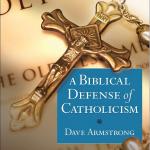
Steve Hays of Tribalblogue is a Protestant anti-Catholic polemicist and sophist. I’ll be responding to one portion of his article, “Catholic prooftexts” (12-17-17, Tribalblogue). His words will be in blue.
*****
2 Thessalonians 2:15 (RSV) So then, brethren, stand firm and hold to the traditions which you were taught by us, either by word of mouth or by letter.
Luke 1:1-2 Inasmuch as many have undertaken to compile a narrative of the things which have been accomplished among us, [2] just as they were delivered to us by those who from the beginning were eyewitnesses and ministers of the word,*1 Corinthians 11:2 I commend you because you remember me in everything and maintain the traditions even as I have delivered them to you.*1 Corinthians 11:23-24 For I received from the Lord what I also delivered to you, that the Lord Jesus on the night when he was betrayed took bread, [24] and when he had given thanks, he broke it, and said, “This is my body which is for you. Do this in remembrance of me.”*1 Corinthians 15:1-8 Now I would remind you, brethren, in what terms I preached to you the gospel, which you received, in which you stand, [2] by which you are saved, if you hold it fast — unless you believed in vain. [3] For I delivered to you as of first importance what I also received, that Christ died for our sins in accordance with the scriptures, [4] that he was buried, that he was raised on the third day in accordance with the scriptures, [5] and that he appeared to Cephas, then to the twelve. [6] Then he appeared to more than five hundred brethren at one time, most of whom are still alive, though some have fallen asleep. [7] Then he appeared to James, then to all the apostles. [8] Last of all, as to one untimely born, he appeared also to me.*Romans 6:17 But thanks be to God, that you who were once slaves of sin have become obedient from the heart to the standard of teaching to which you were committed,*Galatians 1:9, 12 As we have said before, so now I say again, If any one is preaching to you a gospel contrary to that which you received, let him be accursed. . . . [12] For I did not receive it from man, nor was I taught it, but it came through a revelation of Jesus Christ.*1 Thessalonians 2:13 And we also thank God constantly for this, that when you received the word of God which you heard from us, you accepted it not as the word of men but as what it really is, the word of God, which is at work in you believers.*2 Thessalonians 3:6 Now we command you, brethren, in the name of our Lord Jesus Christ, that you keep away from any brother who is living in idleness and not in accord with the tradition that you received from us.*2 Peter 2:21 For it would have been better for them never to have known the way of righteousness than after knowing it to turn back from the holy commandment delivered to them.*Jude 3 . . . contend for the faith which was once for all delivered to the saints.
1 Corinthians 11:2 . . . maintain the traditions . . . . even as I have delivered them to you.
2 Thessalonians 2:15 . . . hold to the traditions . . . . taught . . . by word of mouth or by letter.
2 Thessalonians 3:6 . . . the tradition that you received from us.
1 Corinthians 15:1 . . . the gospel, which you received . . .
Galatians 1:9 . . . the gospel . . . which you received.
1 Thessalonians 2:9 . . . we preached to you the gospel of God.
Acts 8:14 . . . Samaria had received the word of God . . .
1 Thessalonians 2:13 . . . you received the word of God, which you heard from us, . . .
2 Peter 2:21. . . the holy commandment delivered to them.
Jude 3 . . . the faith which was once for all delivered to the saints.
As I wrote in A Biblical Defense of Catholicism:
In St. Paul’s two letters to the Thessalonians alone, we see that three of the above terms are used interchangeably. Clearly then, tradition is not a dirty word in the Bible, particularly for St. Paul. If, on the other hand, we want to maintain that it is, then gospel and Word of God are also bad words! Thus, the commonly asserted dichotomy between the gospel and Tradition, or between the Bible and Tradition, is unbiblical itself and must be discarded by the truly biblically-minded person as (quite ironically) a corrupt tradition of men. (p. 13)
5. Of course, there are commands in Scripture which do apply beyond their immediate audience. But there’s no automatic presumption that any or every divine command is binding on all Christians at all times and places. That, rather, depends on the nature of the command, the wording of the command, and/or the context in which it’s given. You’ve taken a verse of Scripture, stripped it of its historical context, and then reapplied it willy-nilly to your denomination of choice.
Now Steve tries to soften his impossibly incoherent previous stance, but it’s too late: the damage is already done to the reader inclined to accept his relentlessly unbiblical and self-defeating positions. The overall scriptural data on tradition and the rule of faith is abundantly clear, and it is harmonious with Catholicism, and not at all with Protestantism and its false principle, sola Scriptura.
6. Paul isn’t appealing to apostolic tradition, in the customary sense of tradition. The concept of tradition connotes a chain of transmission with links in the chain. But that’s not what Paul is describing. He’s explicitly referring to direct oral teaching, from Paul to his immediate audience.
That’s not true, since Paul also refers to reception “by letter.” That means that they are bound to the teachings in his epistles (which later were determined to be divinely inspired, God-breathed Holy Scripture as well as by oral teachings not written down (some of which, for all we know, may never have been written down or included in the Bible).
There are no intervening links. Not what Paul taught a second person who passed it along to a third person who passed it along to a fourth person. That’s not what Paul has in view. Rather, hold fast to what Paul taught you in person.
Again, the passage has to be understood in conjunction with related ones, that repeatedly describe a tradition that is delivered and received. Steve appears to simply ignore those, since they are contrary to his preferred view. But that’s not how proper biblical interpretation is done. One must accept what the Bible teaches: not force it into something we want that is foreign to it.
Face-to-face transmission from an apostle to a Christian. The principle is restricted to Christians with firsthand knowledge of Paul’s oral teaching.
Again, this proves too much. If he claims that it’s only Paul’s oral teaching to his immediate hearers that is in view, then he must say that this is true also for his epistles, which he mentions in the same passage. That gets back to the problems I discussed above. It would mean that his epistles, too, are only binding to a tiny, tiny percentage of all the Christians who have ever lived.
Its surely not teaching what Steve is claiming it teaches, since that would be incoherent mishmash, and inspired Scripture is neither illogical nor incoherent.
I submit that the only coherent and self-consistent interpretation of 2 Thessalonians 2:15 is what I have submitted, which is, of course, Catholic teaching: there is such a thing as an infallible, binding Sacred Tradition, including oral components that may not specifically end up in Scripture.













